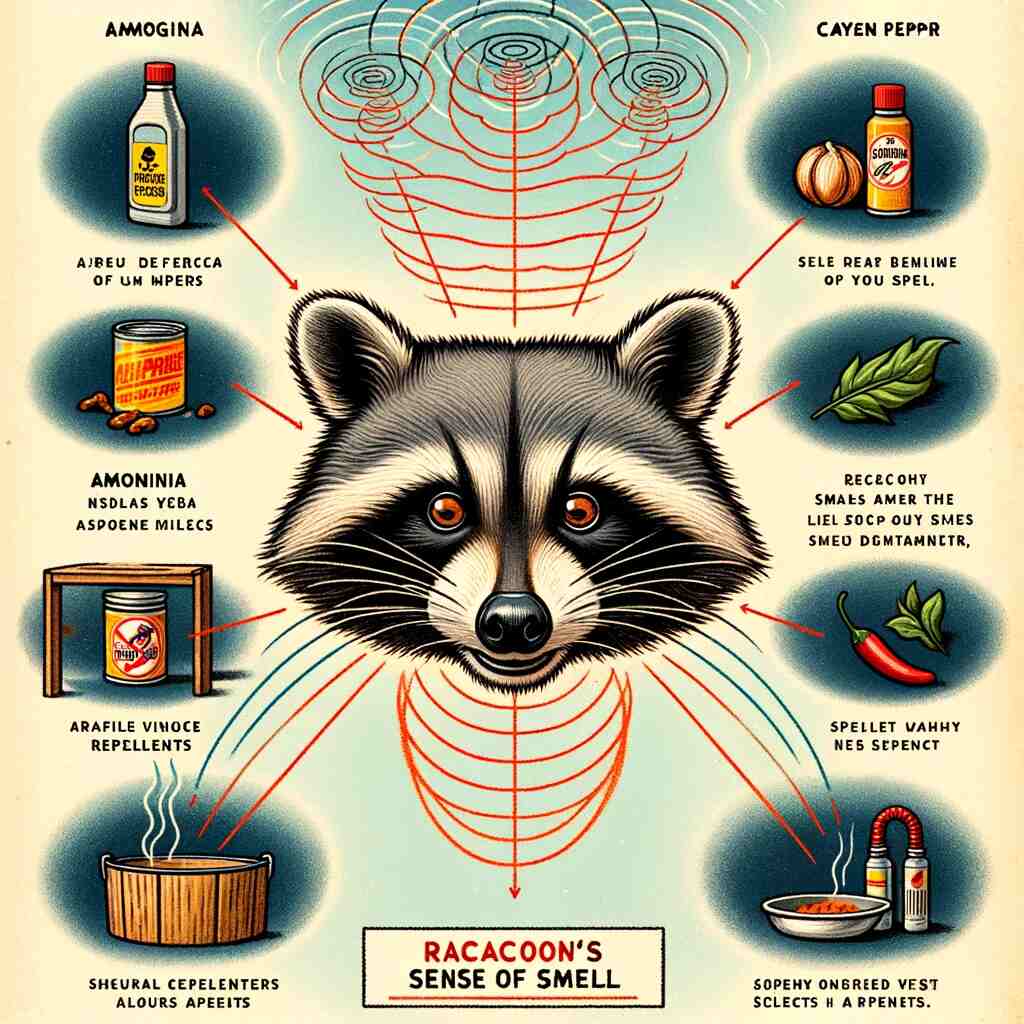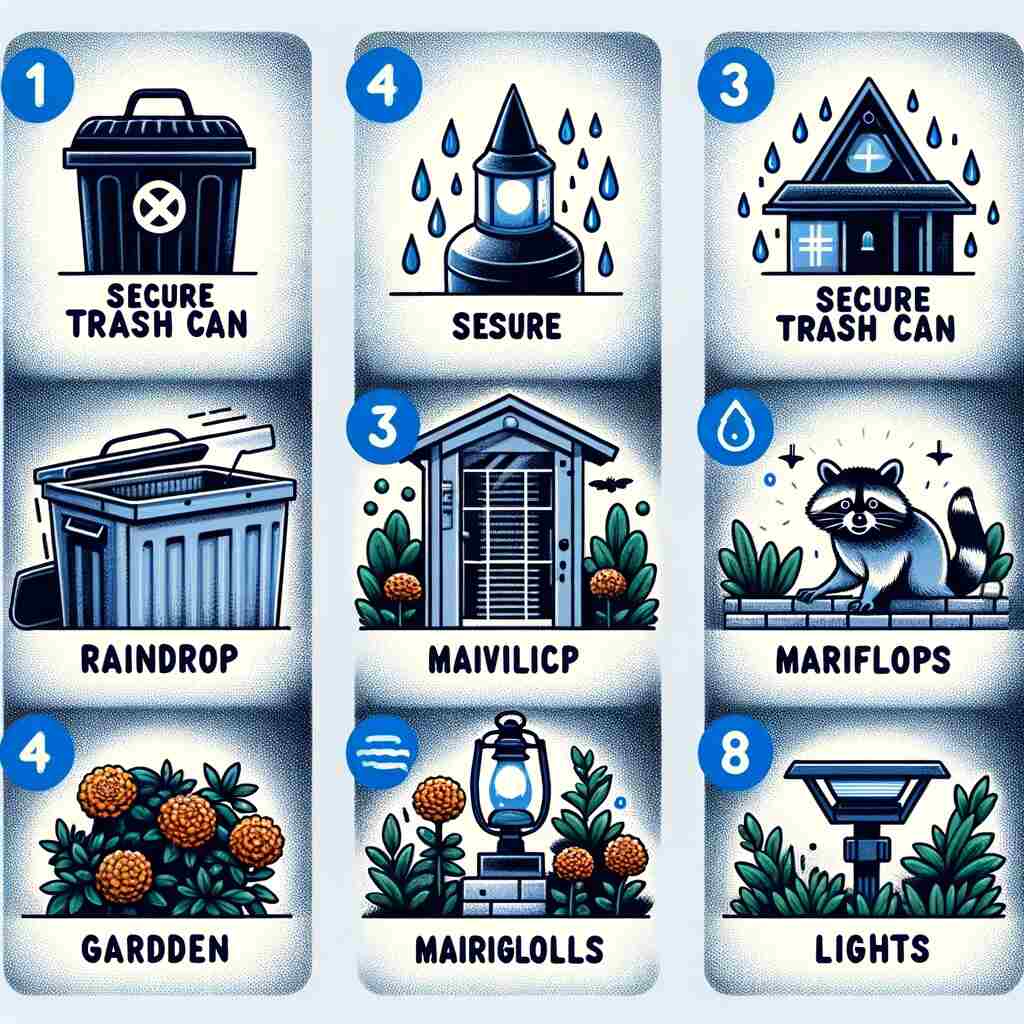Raccoons, with their charming appearance and mischievous behavior, can quickly become a nuisance when they invade your yard or property. These intelligent nocturnal mammals are known for their scavenging habits, and if left unchecked, they can cause significant damage. Fortunately, you can deter raccoons effectively by using various scents, many of which are readily available in your kitchen or garden. Let’s explore what scent will keep raccoons away, delve into the science behind their effectiveness, and provide you with practical tips on how to use them to keep raccoons at bay.

Table of Contents
ToggleUnderstanding Raccoon Behavior
Before we dive into the world of raccoon repellents, it’s essential to understand why raccoons are drawn to your property in the first place. Raccoons are primarily motivated by three factors:
- Food: Raccoons are opportunistic eaters and will devour just about anything, including pet food, trash, fruits, vegetables, and small animals.
- Water: Like all creatures, raccoons need water to survive, so they’ll seek out water sources like ponds, birdbaths, or leaky hoses.
- Shelter: Raccoons often look for safe and secure places to rest and nest, such as attics, crawl spaces, and chimneys.
To effectively repel raccoons, you should address these attractants while incorporating scents that discourage them from sticking around.

Scents That Repel Raccoons
-
Ammonia
Ammonia is a potent scent that raccoons find highly unpleasant. They have a sensitive sense of smell, and the pungent odor of ammonia can be overwhelming for them. To use ammonia as a raccoon repellent:
- Mix equal parts ammonia and water.
- Soak rags or cotton balls in the ammonia solution.
- Place these ammonia-soaked items strategically in areas where raccoons are active, such as near garbage cans or potential entry points into your home.
- Regularly replace the ammonia-soaked items to maintain their effectiveness.
-
Cayenne Pepper
Cayenne pepper is another scent that raccoons dislike due to its strong, spicy aroma. To use cayenne pepper as a raccoon repellent:
- Sprinkle cayenne pepper powder around your property’s perimeter, especially in areas where raccoons frequent.
- Reapply the powder after rain or as needed to keep it potent.
-
Peppermint Oil
Peppermint oil, pleasant to humans but repulsive to raccoons, can effectively deter these creatures. Here’s how to use peppermint oil:
- Soak cotton balls or rags in peppermint oil.
- Place the peppermint-scented items in and around your garden, trash cans, or entry points to your home.
- Refresh the peppermint scent as needed.
-
Eucalyptus Oil
Eucalyptus oil, with its strong medicinal scent, can also deter raccoons effectively. Here’s how to use it:
- Mix eucalyptus oil with water in a spray bottle and apply it to areas of concern like your garden plants, trash cans, or potential entry points.
- Place eucalyptus-scented items strategically around your property.
-
Mothballs
Mothballs contain naphthalene or paradichlorobenzene, chemicals that emit a strong odor that raccoons find unpleasant. However, exercise caution when using mothballs:
- Place mothballs in mesh bags or containers with holes to disperse the scent while keeping them out of reach of pets and children.
- Position the mothballs in areas frequented by raccoons, ensuring they are not easily accessible to other animals or people.

The Science Behind Scent Repellents
Understanding why certain scents repel raccoons is essential for their effective use. Raccoons possess a highly developed olfactory system, relying heavily on their sense of smell to navigate and find food. When exposed to strong, unfamiliar scents, raccoons interpret them as potential threats or unsafe environments.
Ammonia, cayenne pepper, and peppermint oil, for example, are potent scents that can overwhelm a raccoon’s sensitive nose, signaling danger and encouraging them to avoid the area. Eucalyptus oil, with its medicinal aroma, has a similar effect. Mothballs, on the other hand, emit a noxious odor that many animals, including raccoons, find repulsive.

Tips for Using Scent Repellents Effectively
- Identify Problem Areas: Begin by identifying the specific areas of your property where raccoons are causing trouble, such as gardens, trash cans, or potential entry points into your home.
- Mix Scents: To enhance their effectiveness, consider mixing different scents together. Combining ammonia with cayenne pepper or peppermint oil with eucalyptus oil can create a more potent deterrent.
- Rotate Scents: Raccoons can become accustomed to a single scent over time. To prevent habituation, change the type of scent or the location of repellents periodically.
- Maintain Consistency: Consistency is key when using scent repellents. Reapply or replace the scented items regularly, especially after rainfall or heavy winds, which can diminish their effectiveness.
- Secure Trash Cans: Garbage is a common attractant for raccoons. Invest in raccoon-proof trash cans or secure existing ones with bungee cords or locks to deny raccoons easy access.
- Seal Entry Points: If raccoons are attempting to enter your home, inspect for potential entry points like openings in the attic, crawl spaces, or damaged screens. Seal these gaps to deny raccoons access.
- Remove Food Sources: Eliminate potential food sources from your property, such as pet food left outside, fallen fruit from trees, or compost piles that raccoons can raid.
- Install Motion-Activated Lights or Sprinklers: Raccoons prefer darkness and quiet when foraging for food. Install motion-activated lights or sprinklers in areas where raccoons are active to startle them and make them feel uncomfortable.
- Use Natural Deterrents: Consider planting natural raccoon deterrents in your garden, such as marigolds or prickly plants like holly bushes, which raccoons are less likely to disturb.
- Consult a Professional: If your raccoon problem persists despite your best efforts, it may be time to consult a pest control professional who can provide specialized solutions.
Conclusion
While raccoons may appear charming, their presence can lead to significant property damage. Using scents as a raccoon repellent is an eco-friendly and humane way to deter these clever creatures effectively. By understanding raccoon behavior, selecting the right scents, and using them strategically, you can create an environment that raccoons will want to avoid.
Consistency and persistence are key to long-term success in keeping raccoons away from your home and garden. With the information and tips provided in this guide, you’ll be well-equipped to protect your property from raccoon invasions.










